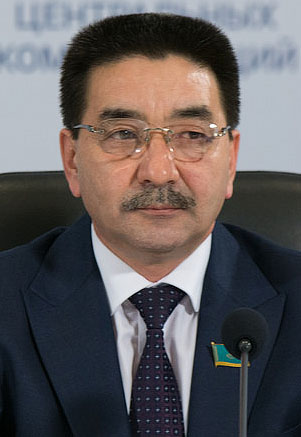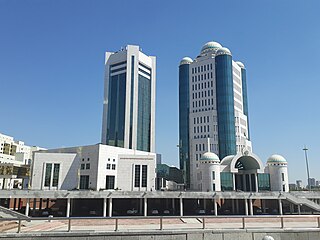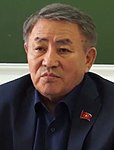
Nursultan Abishuly Nazarbayev is a Kazakh politician who served as the first President of Kazakhstan, from the country's independence in 1991 until his formal resignation in 2019, and as the Chairman of the Security Council of Kazakhstan from 1991 to 2022.

Dariga Nursultanqyzy Nazarbayeva is a Kazakh businesswoman and politician who is the daughter of Nursultan Nazarbayev who was the President of Kazakhstan from 1990 to 2019. She was a member of the Mäjilis from 2004 to 2007, 2012 to 2015 and 2021 to 2022. She was Deputy Chairwoman of Mäjilis from 2014 to 2015 until being appointed as a Deputy Prime Minister under Massimov's cabinet. She was a member of the Kazakh Senate from 2016 to 2020, serving as Senate Chairwoman from 2019 to 2020. She is one of the richest women in Kazakhstan.

The president of the Republic of Kazakhstan is the head of state of the Republic of Kazakhstan and the commander-in-chief of the Armed Forces of the Republic of Kazakhstan. The president is the holder of the highest office within the Republic of Kazakhstan. The powers of this position are described in a special section of the Constitution of Kazakhstan.

The "Auyl" People's Democratic Patriotic Party or simply as Auyl, is a political party in Kazakhstan. It was originally founded by Gani Qaliev on 30 January 2000 before eventually merging with the Party of Patriots of Kazakhstan on 5 September 2015. The party is currently led by Senator for Turkistan Region Äli Bektaev from August 2015. With a membership of around 300,000 people, Auyl has participated in every Kazakh parliamentary election since 2004 and nominated presidential candidate Toleutai Raqymbekov in the 2019 presidential election. It first entered the Mäjilis at the 2023 legislative election, winning eight seats and becoming the largest opposition party.
The People's Party of Kazakhstan is a left-wing social democratic political party in Kazakhstan, chaired by Ermūhamet Ertısbaev. The secretaries of the central committee are Turgyn Syzdyqov, Gauhar Nugmanova, Viktor Smirnov and Jambyl Ahmetbekov.

Zharmakhan Aitbaiuly Tuyakbay is a retired Kazakh politician. He was the chairman of the Nationwide Social Democratic Party from 2007 to 2019 and prior to that, he served as the Mäjilis chairman from 1999 to 2004.

Amanat, previously known as Nur Otan until 2022, is a political party in Kazakhstan. Being the largest to date, it has been the ruling party of the country from 1999, with a membership claiming to be of over 762,000 people in 2007. The Amanat has been led by Erlan Qoşanov since 26 April 2022.

Legislative elections were held in Kazakhstan on 15 January 2012. The result was a victory for the Nur Otan party, which won 83 of the 98 seats in the Mäjilis. However, the Organization for Security and Co-operation in Europe (OSCE) stated that the election "did not meet fundamental principles of democratic elections." The elections marked the first time that the second-placed party would gain parliamentary seats irrespective of whether it cleared the 7% electoral threshold. Due to the Zhanaozen massacre and the resulting state of emergency there, the election was not planned to be held in Zhanaozen. However, this decision was overturned on 10 January 2012.

Nurlan Zairollauly Nigmatulin is a Kazakh politician who served as the Chairman of the Mäjilis from 22 June 2016 to 1 February 2022 and from 20 January 2012 to 3 April 2014. Prior to that, he headed the Presidential Administration of Kazakhstan, and was the first deputy chairman of Nur Otan from 2009 to 2012, and äkim of Karaganda Region from 2006 to 2009.

Legislative elections were held in Kazakhstan on 20 March 2016. The date was set by president Nursultan Nazarbayev on 20 January 2016, when he dissolved the Mäjilis after it had requested dissolution on 13 January, with the reason cited being the economic crisis caused by low oil prices. Normally, the term of the Mäjilis would have expired in fall of 2016.

The Presidential Band of the State Security Service of the Republic of Kazakhstan, formerly the Band of the Republican Guard of Kazakhstan, is a military music unit made for state ceremonies carried out by the State Security Service of Kazakhstan.

Snap presidential elections were held in Kazakhstan on 9 June 2019 to elect the President of Kazakhstan following the resignation of long-term President Nursultan Nazarbayev in March 2019. This was the sixth presidential election held since Kazakhstan's independence. The elections were not free and fair, and were widely denounced as a sham. Acting president Kassym-Jomart Tokayev of Nur Otan won the election.

Jambyl Aujanuly Ahmetbekov is a Kazakh politician, from 2007 to 2023 he was the Secretary of Central Committee of the People's Party of Kazakhstan, and from 2012 to 2023 a member of the Mazhilis. He was a nominee for the Communist People's Party of Kazakhstan (QKHP) in the 2011 and 2019 Kazakh presidential election.

Legislative elections were held in Kazakhstan on 10 January 2021 to elect the members of the Mäjilis to the 7th Parliament of Kazakhstan. They were the eighth legislative elections in Kazakhstan's history since independence and coincided with the 2021 local elections. The elections were the first to be held under Kassym-Jomart Tokayev's presidency and the first since 2004 to be held at the normally scheduled date, rather than due to an early dissolution of the Mäjilis.

Serikbolsyn Abdildauly Abdildin was a Kazakh economist, politician, First Secretary of the Communist Party from 1996 to 2010, member of the Mazhilis from 1999 to 2004 and a candidate in the 1999 presidential election. He is often described as "patriarch" for the formation of parliamentarism and the first-drafted Kazakh Constitution in early years of independence. While proclaiming himself as a Communist, Abdildin was vivid supporter for democracy and has called for reforms for a multi-party system with a rule of law.

The Parliament of the Republic of Kazakhstan of the 6th convocation was the legislative term of the Parliament of Kazakhstan.

Erlan Jaqanūly Qoşanov, sometimes romanized as Yerlan Koshanov, is a Kazakh politician who is serving as the member and chairman of the Mäjilis since 2022. Prior to that, he served as the Aqorda Chief of Staff under Kassym-Jomart Tokayev's administration from 2019 to 2022, äkim of Karaganda Region from 2017 to 2019 and the head of the Prime Minister's Office from 2012 to 2017.
Adal, previously known as Birlik until 2020, was a centre-right political party in Kazakhstan that was formed as a result of merger between Rukhaniyat Party and Democratic Party Adilet on 26 April 2013. The party is led by Serik Sultangali, a Kazakh businessman and has a membership of over 300,000 people as of 2021. Since its creation, the Adal has participated in every parliamentary election, often taking last place in terms of vote share and has not never nominated a presidential candidate for the elections. On 26 April 2022, Adal merged with the Amanat party.

Municipal elections were held in Kazakhstan where 730 äkıms whose four-year terms expired were reelected for the first time directly by the population on 25 July 2021 following an introduction of new law by the Parliament, which allowed for direct elections for äkıms of cities with district importance, villages, and the townships of rural districts. From there, the ruling Nur Otan party won majority of 627 municipal races with most of its candidates being incumbents who occupied the äkım positions prior, followed by the Auyl People's Democratic Patriotic Party, Adal, Ak Zhol Democratic Party, People's Party of Kazakhstan, and the Nationwide Social Democratic Party where it secured local race victory in West Kazakhstan Region.

The Special Forces of Kazakhstan trace their history to the Soviet era spetsnaz units operating on the territory of the Kazakh Soviet Socialist Republic within the USSR. These units are the remnants of the former Soviet Army, KGB, the Ministry of Internal Affairs and GRU. Similarly to other post-Soviet states, Kazakhstan's special forces fall under the control of the Armed Forces of the Republic, the Ministry of Interior, and under the National Security Committee.






















